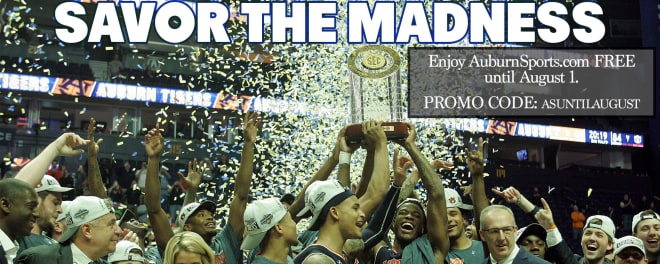MINNEAPOLIS — Horace Spencer smiled and pointed toward a wall to his left.
Plastered on a wall inside the Auburn locker room, a place where smiles were few Saturday night, were images from the Midwest regional title the Tigers claimed in Kansas City. Spencer's photo wasn't up there, but there were photos of Jared Harper and Bryce Brown and Samir Doughty and Malik Dunbar and Austin Wiley and J'Von McCormick and Anfernee McLemore and Chuma Okeke.
The moments from that wall, a remembrance of Auburn's first Final Four push in program history, solicited plenty of smiles to go around.
Spencer will remember that alone — the smiles.
"Look at that championship right there with all the smiles on our faces. That’s what I remember. I don’t remember the last shot," Spencer said, pointing to the imaged wall. "All the memories we made together started flooding into my brain at one time. I see nothing but smiles in my head. Yeah, we were sad in here. But I see nothing but smiles in my mind right now."
Bryce Brown won't be able to let go as easily.
When asked what he'll remember from his time at Auburn, he didn't hesitate to say "this moment right here," referencing the heartbreaking ending to his Tigers career. But given a second to reflect on everything he and his Auburn teammates accomplished — a miraculous turnaround for a program once in the depths of the SEC — Brown, too, smiled.
"I’ll remember Auburn Arena. I’ll remember the SEC Tournament championship. I’ll remember the SEC regular-season championship. Just all the memories Auburn has gave me," Brown said. "It’s been an unbelievable ride, an unbelievable four years. I wouldn’t want to replace it for anything."
Brown and Spencer have been through it all.
They came to Auburn when expectations of a Final Four appearance were laughable to many. They slugged through 11-20 seasons, not even sniffing NIT bids. The two outgoing seniors were part of Auburn's program for four years and the ups and downs have become part of their identity. It developed Spencer through fatherhood. It pushed Brown through a maturation process he didn't know he needed when he arrived.
SEC bottom-feeder to the conference's lone Final Four representative seemed unimaginable. It couldn't have been done without Spencer and Brown.
Steven Pearl was asked what those two meant to the Auburn program. His instinctive response rang true.
"Oh man, do you have an hour?" he said.
"They changed the culture. They changed the perception. They changed Auburn basketball for the better forever. It’s tough because they did so much for this university, for this team, for us as a staff. Having been there with them for four years, that makes it so hard for us as a staff. Just to see them grow right in front of our eyes, they deserve this so much to be on this stage. They’ve earned this. I’m just so proud of everything they’ve accomplished. They have nothing to hang their heads about."
Spencer doesn't take that for granted.
He knows Auburn basketball is different — maybe forever — than it was when he chose the Tigers. Spencer didn't expect to have as resounding an influence on the university's basketball culture, but he grew to personify everything Auburn basketball now stands for — toughness, heart, team-first.
That's Horace Spencer. And by association, that is now Auburn basketball. It's on the future faces of the program to sustain it.
"In this recruiting class coming in, they’ve seen what we’ve done. They know what to do. I have faith in this recruiting class coming in," Spencer said. "Auburn doesn’t lose. Auburn isn’t a losing program. We changed the culture. Keep the culture alive."
That culture will live on in the rafters for years to come.
SEC Tournament champions. Midwest regional champions. The first Final Four in program history. The memories of Auburn University rising to national basketball relevance.
Spencer and Brown won't be a part of Auburn's first national title, if and when that takes place. But they will have laid down the foundation for whoever ultimately accomplishes that feat.
Knowing that doesn't take away the pain of an Auburn career abruptly and undeservedly ended too soon. But it heals some of the pain. It makes them smile.
"I definitely want to get back and see those banners and get a ring," Brown said. "What hurts the most: I won’t be able to wear this jersey again. Hopefully I had a huge impact on this program because this program has definitely changed my life. Not only in basketball, but as a man. As an Auburn man, I’ve grown. I’ve matured. I’m just happy that Auburn gave me the opportunity to wear this jersey and be a great player."
"Hopefully I've done enough."

